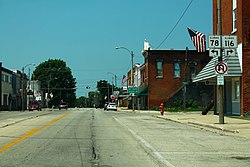Geography
Farmington is located in the northeast corner of Fulton County. Illinois Routes 78 and 116 pass through the center of the city. IL 116 enters from the north as North Main Street, and IL 78 enters from the south as South Main Street. The two highways leave the city to the east on East Fort Street. IL 78 leads north 42 miles (68 km) to Kewanee and south 10 miles (16 km) to Canton, the largest city in Fulton County, while IL 116 leads east 22 miles (35 km) to Peoria and west 22 miles to St. Augustine.
According to the 2021 census gazetteer files, Farmington has a total area of 1.51 square miles (3.91 km2), all land. [6]
Demographics
Historical population| Census | Pop. | Note | %± |
|---|
| 1880 | 1,111 | | — |
|---|
| 1890 | 1,375 | | 23.8% |
|---|
| 1900 | 1,729 | | 25.7% |
|---|
| 1910 | 2,421 | | 40.0% |
|---|
| 1920 | 2,631 | | 8.7% |
|---|
| 1930 | 2,269 | | −13.8% |
|---|
| 1940 | 2,225 | | −1.9% |
|---|
| 1950 | 2,651 | | 19.1% |
|---|
| 1960 | 2,831 | | 6.8% |
|---|
| 1970 | 2,959 | | 4.5% |
|---|
| 1980 | 3,118 | | 5.4% |
|---|
| 1990 | 2,535 | | −18.7% |
|---|
| 2000 | 2,601 | | 2.6% |
|---|
| 2010 | 2,448 | | −5.9% |
|---|
| 2020 | 2,389 | | −2.4% |
|---|
|
As of the 2020 census [3] there were 2,389 people, 827 households, and 517 families residing in the city. The population density was 1,587.38 inhabitants per square mile (612.89/km2). There were 1,119 housing units at an average density of 743.52 per square mile (287.07/km2). The racial makeup of the city was 94.94% White, 0.17% African American, 0.21% Native American, 0.00% Asian, 0.08% Pacific Islander, 0.59% from other races, and 4.02% from two or more races. Hispanic or Latino of any race were 1.84% of the population.
There were 827 households, out of which 33.4% had children under the age of 18 living with them, 42.56% were married couples living together, 12.94% had a female householder with no husband present, and 37.48% were non-families. 32.41% of all households were made up of individuals, and 14.03% had someone living alone who was 65 years of age or older. The average household size was 2.99 and the average family size was 2.34.
The city's age distribution consisted of 25.8% under the age of 18, 10.3% from 18 to 24, 23.7% from 25 to 44, 23.6% from 45 to 64, and 16.8% who were 65 years of age or older. The median age was 34.8 years. For every 100 females, there were 106.3 males. For every 100 females age 18 and over, there were 104.1 males.
The median income for a household in the city was $51,335, and the median income for a family was $59,181. Males had a median income of $44,464 versus $31,548 for females. The per capita income for the city was $26,332. About 6.0% of families and 8.5% of the population were below the poverty line, including 3.8% of those under age 18 and 6.7% of those age 65 or over.
This page is based on this
Wikipedia article Text is available under the
CC BY-SA 4.0 license; additional terms may apply.
Images, videos and audio are available under their respective licenses.



